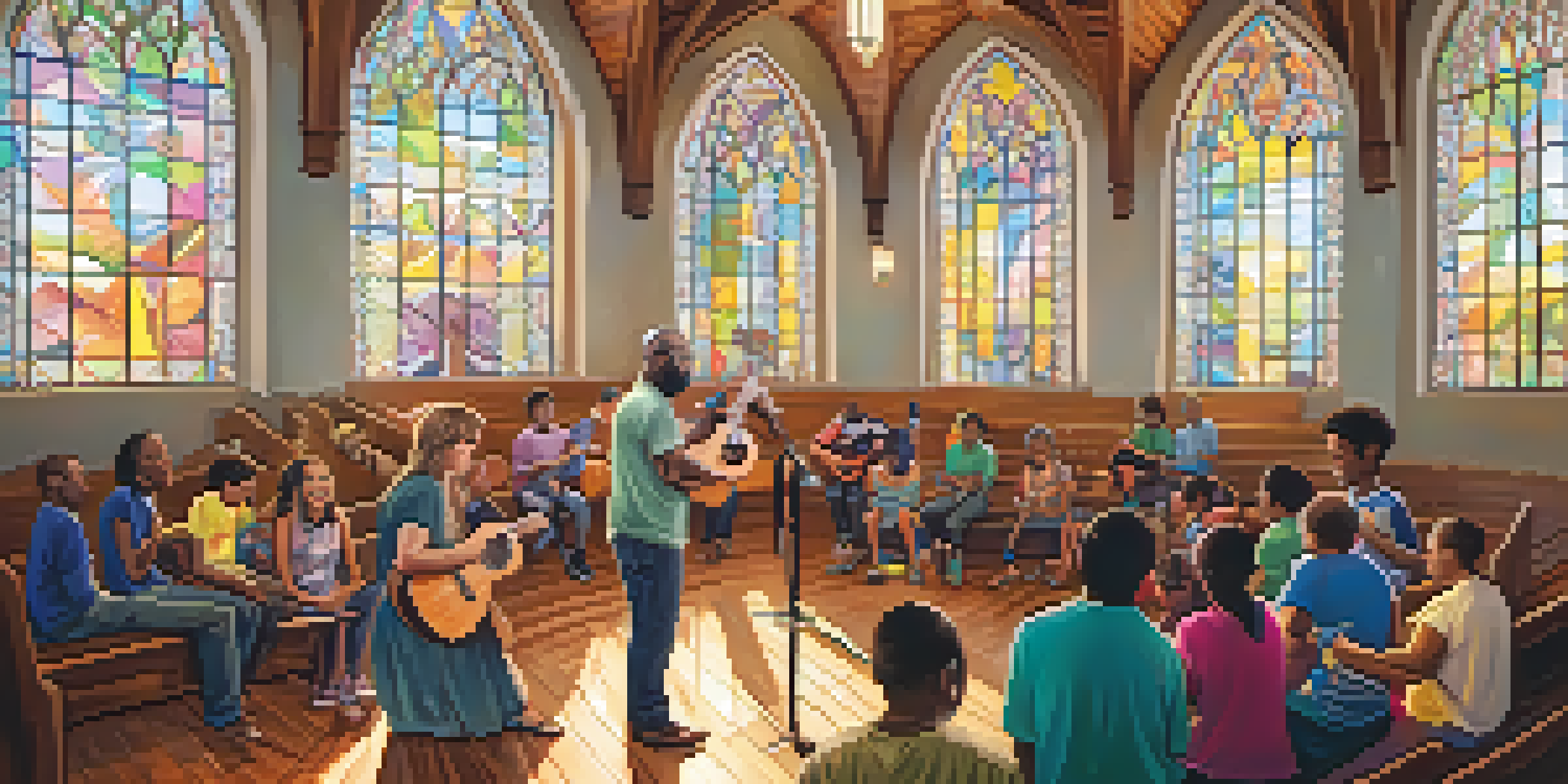Exploring the Role of Ukulele in Modern Worship Services

Introduction to the Ukulele in Worship Settings
In recent years, the ukulele has emerged as a beloved instrument in modern worship services. Its cheerful sound and approachable nature make it an excellent choice for congregations looking to enhance their musical experience. The instrument's popularity has grown not just in casual settings but also within more formal worship environments.
Music is the shorthand of emotion.
Worship leaders are increasingly turning to the ukulele for its unique ability to foster community and connection among worshippers. The ukulele's compact size and lightweight design make it easy to play and transport, making it a practical addition to worship teams. This accessibility allows more people to participate in music-making, which is often a central part of worship.
As churches look for ways to innovate and engage their congregations, the ukulele serves as a refreshing alternative to traditional instruments. Its bright, uplifting sound can create an inviting atmosphere, encouraging congregants to join in song and praise. This shift reflects a broader trend towards inclusivity and creativity in worship practices.
The Ukulele's Unique Sound and Appeal
One of the most captivating aspects of the ukulele is its distinctive sound. Unlike many traditional instruments, the ukulele offers a warm, mellow tone that can evoke feelings of joy and ease. This quality makes it particularly effective in worship settings where the goal is to uplift and inspire attendees.

The ukulele's versatility also adds to its charm, as it can adapt to various musical styles, from folk to contemporary Christian music. This flexibility allows worship leaders to experiment with different arrangements, making services feel fresh and engaging. The instrument can accompany vocals beautifully or stand alone in instrumental worship, offering a range of possibilities.
Ukulele Enhances Worship Community
The ukulele fosters participation and unity among congregants, making it an inviting instrument for communal worship.
Moreover, the ukulele often appeals to younger generations, bridging the gap between traditional worship and modern expressions of faith. Its playful nature can attract those who may feel disconnected from more conventional church music, creating a welcoming space for all. This connection fosters a sense of belonging and encourages personal expressions of faith.
Fostering Community Through Ukulele Worship
Worship is inherently a communal experience, and the ukulele enhances this by inviting participation. With its relatively simple chords and approachable finger placements, many people find it easy to learn and play. This accessibility encourages congregants to pick up the instrument and join in worship, creating a sense of unity.
Where words fail, music speaks.
Ukulele groups and workshops have also become popular in many church communities, where members gather to learn, practice, and play together. These gatherings not only build musical skills but also strengthen relationships among congregants. Sharing music can create lasting bonds and foster a supportive environment within the church.
Additionally, incorporating the ukulele into worship services can encourage collaboration among different age groups. Children, teens, and adults can all participate, sharing their unique perspectives and talents. This inclusivity helps build a vibrant community where everyone feels valued and heard.
Integrating Ukulele into Worship Music Selection
Choosing the right songs for ukulele-led worship can be a powerful way to enhance the overall experience. Many worship leaders are curating setlists that highlight the ukulele's strengths, selecting songs that resonate emotionally and spiritually with the congregation. Familiar tunes often work well, as they encourage participation and sing-alongs.
In addition to well-known hymns and contemporary Christian songs, worship teams are also exploring new compositions specifically designed for the ukulele. These original pieces can bring fresh energy to worship services, allowing congregants to engage with new melodies and messages. This innovation keeps worship vibrant and relevant, reflecting the dynamic nature of faith.
Unique Sound Appeals to All Ages
Its warm, mellow tones and versatility attract both younger generations and traditional worshippers, bridging gaps in musical expression.
Moreover, incorporating the ukulele into worship music selection allows for creativity in arrangement. Worship leaders can create unique renditions of songs, blending different styles and instrumentation. This approach not only enriches the worship experience but also showcases the ukulele's versatility in a modern context.
The Ukulele as a Teaching Tool in Worship
The ukulele also serves as an effective teaching tool in worship settings. Its straightforward nature makes it an ideal instrument for introducing musical concepts to newcomers, especially children. Many churches are using the ukulele to teach rhythm, melody, and harmony in a fun and engaging way.
Through ukulele lessons and group activities, congregants can develop a deeper understanding of music theory while fostering a sense of accomplishment. This educational aspect not only enhances musical skills but also enriches their worship experience by allowing them to participate more fully. It empowers individuals to express their faith through music.
Furthermore, teaching ukulele skills can cultivate leadership within the church community. As individuals become more proficient, they may take on roles as worship leaders or mentors. This ripple effect can inspire others to join in, creating a culture of collaboration and shared learning in worship.
Challenges and Considerations for Ukulele Use
While the ukulele brings many benefits to worship services, there are also challenges to consider. One potential issue is the need for adequate training and resources for worship leaders. Ensuring that those leading worship are comfortable with the instrument and its capabilities is essential for a successful integration.
Additionally, the ukulele may not always fit seamlessly into every worship style. Some congregations may have a more traditional music preference, which could make the transition more challenging. It's important for worship teams to gauge the preferences and needs of their congregation when incorporating new instruments.
Teaching Tool for Musical Growth
The ukulele serves as an effective teaching instrument, helping congregants develop musical skills while enhancing their worship experience.
Finally, as with any musical addition, it's vital to maintain a balance between innovation and tradition. The ukulele can complement existing worship practices, but it shouldn't overshadow the rich heritage of musical expression in faith communities. Finding this balance allows for growth while honoring the past.
Conclusion: The Future of Ukulele in Worship Services
As we look to the future, the ukulele seems poised to play an increasingly prominent role in worship services. Its unique sound, accessibility, and communal qualities align perfectly with the evolving landscape of modern worship. More congregations are likely to embrace this instrument as they seek fresh expressions of faith.
The ukulele not only enriches the musical experience but also fosters deeper connections among congregants. By encouraging participation and collaboration, it helps create a welcoming environment for worshippers of all ages. This sense of community can be transformative, enhancing the overall worship experience.

Ultimately, the ukulele represents a beautiful blend of tradition and innovation in worship music. As churches continue to explore new ways to engage their congregations, this delightful instrument will likely remain a beloved staple in modern worship services for years to come.